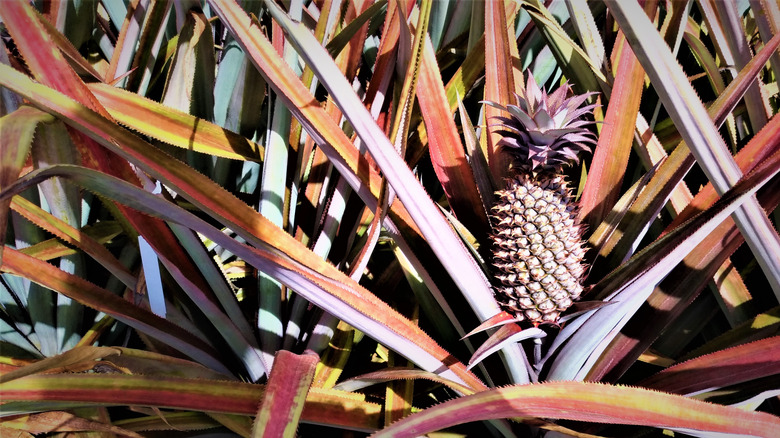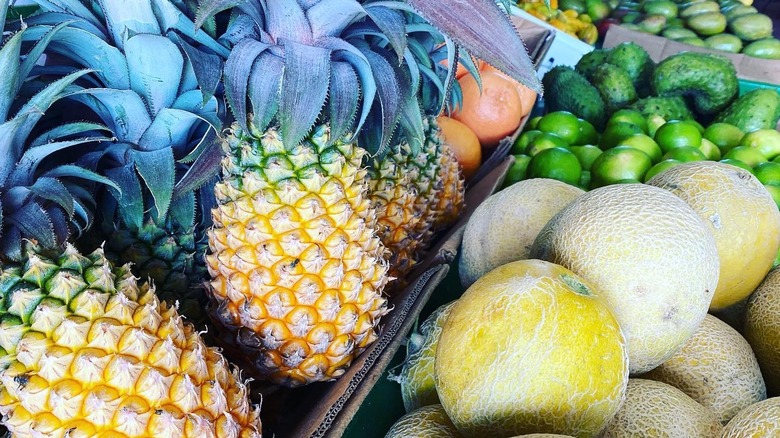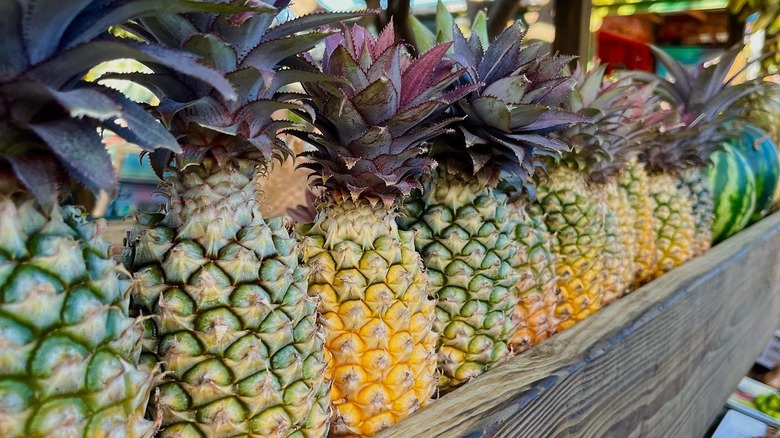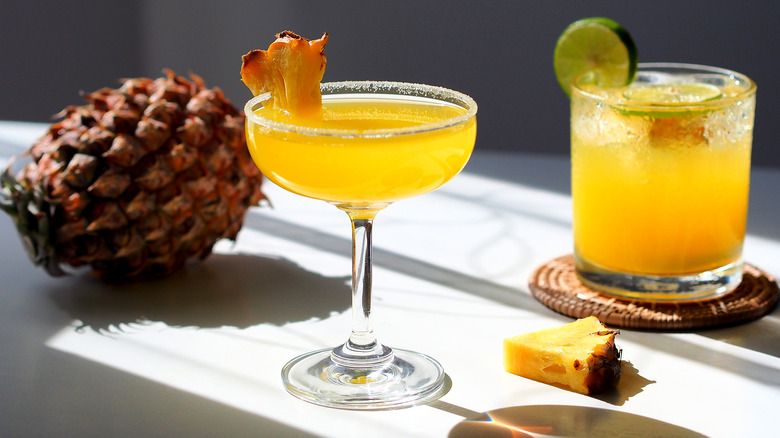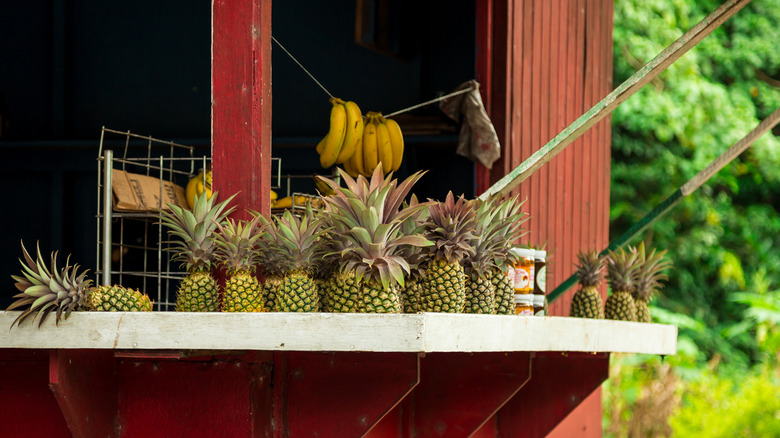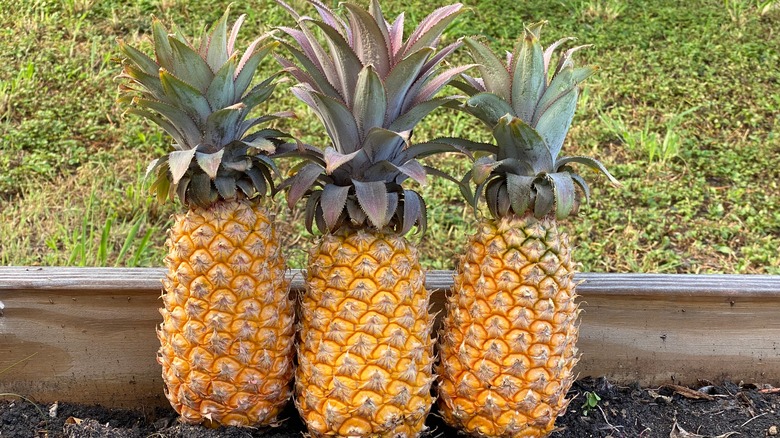The Rare Pineapple Variety Said To Be The World's Sweetest
The Antigua Black pineapple is world-renowned — despite being one of the rarest pineapple varieties. Like Japan's Densuke watermelons, black pineapples are exclusive to a specific local. They're grown on the southwest coast of Antigua, the southernmost island of the Caribbean nation Antigua and Barbuda.
Contrary to its name, the Antigua Black pineapple isn't actually black. In fact, it doesn't look too different from the pineapples you'd find in the grocery store. The flesh is deep yellow and the outer skin remains deep green even after the pineapple is ripe. But the pineapple's appearance has nothing to do with its fame: Antigua pineapples are known for their taste. Often called the world's sweetest pineapple, the fruit has an exceptionally high sugar content.
These pineapples have become a symbol of Antigua. A pineapple design tops Antigua and Barbuda's coat of arms, and the fruit lends its name to restaurants, resorts, and attractions across the country.
What are Antigua Black pineapples?
Like all pineapples, the ancestors of the Antigua Black pineapple (species Ananas comosus) originated in South America. Pineapples were first brought to Antigua in the 17th century by the Arawak people. But unlike most pineapples commercially available in the United States, which are king pineapples, they're considered queen pineapples. There are many different varieties of queen pineapple, which tend to be smaller and more resistant to disease. However, they don't ship as well as king pineapples.
If you were to try to grow Antigua Black pineapples abroad, they wouldn't taste the same. Antigua Black pineapples are a result of the island's unique climate and geography. Antigua's nutrient-rich soil and tropical weather help the fruits flourish.
Antigua pineapples weren't grown commercially until the 1960s when the island's Ministry of Agriculture founded the Cades Bay Pineapple Station. Even at peak production in the late '80s and early '90s, only 20 acres of farms produced pineapples. The fruits are grown year-round, but production is still limited. Farmers take pride in growing pineapples for quality, not quantity.
Fortunately for farmers, pineapples are resilient crops. Still, climate change poses a significant threat to the Antigua Black pineapple. Since Antigua's climate is what makes the fruit unique, even small variations in temperature or rainfall could impact the taste.
What do Antigua Black pineapples taste like?
People who've tasted the Antigua Black pineapple claim it has a flavor like no other. Despite its rarity, the fruit is often used in Antiguan dishes and cocktails, but many say it's best eaten fresh.
The Antigua Black pineapple gets its exceptional flavor from its unique environment, which boasts a sunny climate, moderate rainfall, and rich soil. The fruit is low in fiber and acid, has a crisp texture, and offers an exceptionally sweet flesh. With its distinct taste and texture, it's no wonder that the fruit has garnered an international reputation as one of the most popular varieties.
If you manage to get your hands on one of the famous fruits, you won't need your pineapple corer. While pineapple cores have many uses, many people discard them thanks to their tough texture. The cores of Antigua Black pineapples are soft and sweet, though — just as tasty as the rest of the fruit.
How to cook with Antigua Black pineapples
On isolated islands like Antigua, chefs have to work with what they have. This ingenuity combines with a rich history and complex cultural influences to create Caribbean cuisine. The result? Caribbean cuisine is full creative, flavorful dishes, often with fruit as a main ingredient.
In bars and resorts across the island, bartenders combine pineapple with spirits. The fruit is an integral ingredient in many of the island's famous cocktails, like the Barbuda sands and the Antiguan smile. But Antigua's famous pineapples aren't just used in drinks. You can add them to gazpacho for a Caribbean take, grill them, or simmer them with chicken for a delectable stew.
Want a taste of Antiguan cuisine? Consider recreating these dishes at home with pineapples from your local grocery store. They won't have the same flavor, but they will give you a new perspective on the fruit.
Where to buy Antigua Black pineapples
Unless you happen to live on Antigua or a neighboring island, you'll have a tough time finding the famous black pineapple. Yields are small and the delicate fruit is difficult to transport, so it's rarely sold abroad.
Even if you travel to Antigua, getting your hands on one might be difficult. Production is so limited that many resorts import pineapple from the United States in order to meet demand. To ensure you're getting the real deal, consider venturing a little farther afield. You might have better luck finding genuine Antiguan pineapples at one of the island's many roadside stands. There, you can find locals selling the fruits whole or sliced and ready to eat.
If you have time, consider booking a tour at a local farm. You'll get a first-hand look at pineapple production — and a taste of the famous Antigua pineapple straight from the source.
What is the nutritional value of Antigua Black pineapples?
Fresh pineapple is highly nutritious. Medical News Daily explains that one cup contains a whopping 131% of your daily vitamin C and the fruit is chock full of other healthy vitamins, too. It's even fat-free and cholesterol-free — so experts recommend it as an alternative to processed sweets. Generally, the fruit is a healthy choice for people with diabetes thanks to its high fiber content. However, Healthline notes that people with diabetes should be mindful of the sugar content in pineapples. Since Antigua Black pineapples are higher in sugar and lower in fiber than the ones you typically find in the store, they may not be as beneficial.
Some cultures use pineapples medicinally. That's because they contain bromelain, an enzyme with anti-inflammatory benefits. Bromelain has a host of other health benefits, as well. One study published in the journal Nutrition and Metabolism found that it's especially good for people with cardiovascular disease; Another study from the journal Evidence-based Complementary and Alternative Medicine found that it's good for and arthritis. While you can up your bromelain intake with over-the-counter supplements, remember that dietary supplements shouldn't serve as a replacement for fresh fruit.
Despite bromelain's benefits, not everyone should eat it. According to Healthline, the enzyme can interact with some medications, so you should avoid pineapple if you're taking blood thinners, antibiotics, or sedatives.
